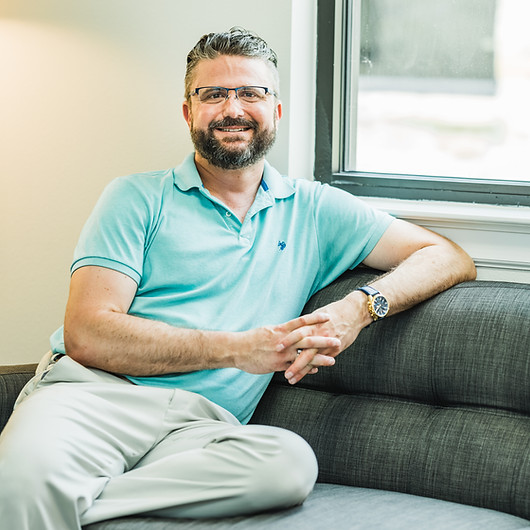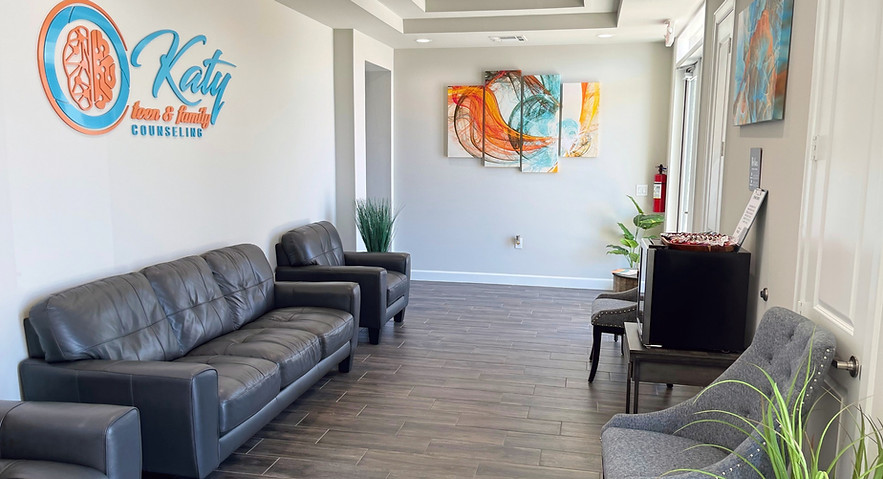
About Jason: Owner, Lead Clinician, & Board Certified in Neurofeedback
Father, Leader in the Field of Teen Mental Health, and Specialist in Teen, Young Adult, & Family Therapy
Also, Board Certified in Neurofeedback & Associate Fellow Through BCIA. The Gold Standard of Neurofeedback Board Certification
Eye Movement Desensitization & Reprocessing (EMDR) Therapist
Certified Brain Health Professional Through the Amen Clinic


Jason Drake, LCSW, BCN-L, Associate Fellow, EMDR Trained
Owner & Lead Clinician
I have counseled and provided therapeutic services to teens, young adults, and families since 2003. I also have been blessed with the opportunity to work through the highs and lows, good times and tough times, with my own two teen boys.
A primary reason I chose to work with teens, young adults, and families is due to my own turbulent teen years. During this period of time in the late 80's to early 90's, it was not as acceptable to talk about emotional and behavioral struggles. These things were not discussed in my family as well. And, unlike today, going to a counselor was very stigmatized.
As a teen, navigating these very complex matters on my own was overwhelming. It created heartache, worry, fear, and stress for my parents and feelings of hopelessness, anger, depression, and anxiety for me as a teen. Along with these emotions came the accompanying behavior problems.
There were answers out there, but I did not know how to access them. The simple act of spending time with a teen counselor could have helped me and my family navigate my struggles. As that was not the case, these struggles followed me into my young adult years. Looking back, I think about how much better it would have been had I been able to resolve these struggles as a teen.
My experience has provided me the personal experience and professional drive to help other teens and families find those answers. My goal is to help you as a teen, you as a young adult, and your family resolve your struggles. Your teen, young adult, or family story does not have to include emotional or behavioral challenges.
Let us help you chart a different course. There are answers. There is hope. There is healing. We can help your teen, young adult, and your family avoid the unnecessary heartache that comes with emotional and behavioral struggles.

Educational Background
Knowing that I wanted a career where I could work with teens, young adults, and families, I chose to study Clinical Social Work and Psychology. I graduated with a Bachelor Degree in Social Work with a Minor in Psychology from the Weber State University School of Social Work.
While I attended Weber State University, I worked as an Assistant Program Manager and Lead Trainer for an all boys group home. This was a home where boys received individual, group, and family therapy. Due to their risk to harming themselves or someone else, they stayed at the group home to help them learn the skills necessary to succeed in life.
I went on to earn my Masters Degree in Clinical Social Work from the Barry University School of Social Work in Miami, Florida. Since earning my Masters Degree in Clinical Social Work in 2003, I have spent my career in various therapeutic settings providing therapy to teens, young adults, and their families.
My professional career has led me across four states (Florida, Utah, Idaho, and now Texas) which has provided an array of opportunities to develop as a specialist and expert in teen counseling, young adult counseling, and family therapy.


I have also enjoyed volunteering as a Scout leader with teens in the Scouting program. I have also spent time as a Church leader for a church's congregation and as a group leader in the church's Young Men's program.
Being crystal clear in my intent at the start of my career has helped me to remain committed to a path of teen counseling, young adult counseling, and family therapy. My lifelong pursuit of and specializing in teen counseling, therapy for young adults, and family therapy has provided a unique expertise.
I have been called on to present at conferences, trainings, and have provided webinars across this great state of Texas and nationally. I am also part of a team providing expert quality improvement coaching and assistance to residential treatment programs across the country.

Professional Background & History
Throughout my career, I have had the many opportunities to hone my specialization in teen therapy, young adult counseling, and family counseling.
For much of my career, I have worked with teens and young adults of C-Suite Executives, Doctors, Attorneys, successful entrepreneurs and business owners, and other teens, young adults and families nationally as well as internationally (i.e., China, Morocco, etc.).
I've also had the opportunity to work with teens who have experienced abuse/neglect to help them through that difficult journey.
My expertise in teen counseling, being a young adult therapist, and family therapy stems from the opportunities I've had to work:
-
As a therapist providing In-home Family Counseling in Miami, Dade & Broward Counties
-
As a therapist in an Adolescent Substance Abuse Program providing:
-
Day Treatment/Partial Hospitalization substance abuse and family therapy
-
Intensive Outpatient teen, young adult, and family substance abuse treatment
-
Outpatient teen, young adult, and family therapy substance abuse treatment
-

Advanced Practice & Specialty Training in Counseling Teens
As a teen therapist, young adult counselor, and family counselor, I have been fortunate to receive specialized training. The training that I have engaged in are those approaches that are supported by research. As such, they tend to produce change at a faster pace. Since starting my career as a teen therapist, young adult therapist, and family counselor in 2003, I have been trained in the following, research supported, approaches:
-
Collaborative Problem Solving/Collaborative and Proactive Solutions (CPS)
I have also gone on to undertake advanced practice, specialty trainings. These trainings provide me the opportunity to reach a broader base of teens, young adults, and families.
There is no one approach that is effective for all teens, young adults, and their families. Being trained an a variety of teen therapy, young adult therapy, and family counseling approaches enables me to tailor the therapy to each teen, young adult, and family I work with.
In addition to best practices approaches that I use, I have also been trained in and utilized the following advanced practice, specialty counseling approaches:

Practical Application
Let's say that your teen or young adult struggles from depression. The brain map collected and created would resemble a brain that performs as a depressed brain.
With the training protocol, the teen or young adult brain performance is compared to a 'normal' brain of teen's or young adult's their own age and gender. When the brain performs similar to the normal brain, without depression, your teen or young adult can control the avatar on the screen. Your teen or young adult earns points, can level up, and collect other avatars through their performance.
This system of rewards and reinforcement helps teach the brain to change how it performs in that specific area. Over 40 sessions of neurofeedback training and thousands or rewards and reinforcement, the brain learns to perform without depression.
Neurofeedback is a great approach for most teens, young adults, (and adults). It is uniquely appropriate for those who:
-
Are shy and may struggle to open up in therapy
-
Are resistant to starting therapy as they don't want to talk about their problems
-
Have experienced a traumatic event and have struggled in talk therapy due to re-experiencing memories, sensations, etc. related to the trauma.
-
Have tried therapy in the past and have not found the benefit through talk therapy
-
Have tried medications for their unique struggle and have not found the benefit they were looking for
-
Teens or young adults who can focus for up to 35-40 minutes at a time and can commit to up to 40+ sessions
Neurofeedback provides another avenue for teen counseling and young adult therapy. Traditional talk therapy can help the majority of teens who participate if they are open and stick with it. Talk therapy may not be for everyone and neurofeedback provides a very effective alternate to talk therapy.

Board Certified in Neurofeedback
Neurofeedback is an approach, supported by research, that focuses on treating the struggle at the source of the struggle – the brain. Neurofeedback zeros in on the brain based function behind the struggle to alleviate the symptoms. Talk therapy focuses more on the symptoms and underlying psychological causes to help resolve the symptoms – yet the underlying cause may still be present.
Neurofeedback can help whether your teen or young adult struggles from:
-
Performance/Mental Blocks
Over the past 20 years, we have made leaps and bounds in what we have learned about the brain. As MRI and other technology became available, we could start recording images of the brain's performance.
With the information collected over the last 20+ years through research using fMRI, PET scans, and other approaches, we've been able to collect a large data base of normal performing brain maps.
In short, neurofeedback is a less intrusive method in recording the brain is performing. I place a cap that resembles a swimmer's cap on the person's head. In that cap there are 19 sensors embedded. Those sensors pick up and read the electrical signals the brain generates, much like an EKG (for the brain, it is referred to as an EEG).
Once the brain's performance has been recorded, I use state of the art software to generate a brain map. This is a 2D and 3D representation of your teen's brain. This brain map is compared to a normative data base of normal performing brains. I then create a training protocol that is specific and unique to the teen's brain performance.
The training program uses a system of learning that the brain recognizes. I use software that resembles a video game yet this game is not played with handheld controllers.
Board Certified in Neurofeedback (BCN): Biofeedback Certification International Alliance (BCIA)
To become a Board Certified Neurofeedback Therapist, a therapist must undertake a rigorous training experience and be proficient in the areas trained. As a neurofeedback therapist, I have undertaken this training through BCIA.
Biofeedback Certification International Alliance (BCIA) is recognized as the certification body for the practice of biofeedback by the Association of Applied Psychophysiology and Biofeedback (AAPB), the Biofeedback Federation of Europe (BFE), and the International Society for Neuroregulation and Research (ISNR).
BCIA's mission certifies individuals who meet education and training standards in biofeedback and progressively recertifies those who advance their knowledge through continuing education.
To be a BCIA neurofeedback therapist, a licensed clinician must be in the process or has completed the following:
-
Successfully completed a neuroanatomy, neurophysiology, physiological psychology, or course(s). This provides a sound basis for the brain and how it functions, and must be taken from a regionally accredited academic institution or a BCIA-approved provider.
-
Take a 36-hour didactic education program specifically covering all topics as listed in the BCIA Blueprint of Knowledge taken from a BCIA-accredited training program.
-
Spend 25 contact hours (2 must be face to face) with a BCIA-approved mentor to learn to apply the clinical neurofeedback skills through the review of:
-
10 sessions of self-regulation where the clinician is the client in neurofeedback sessions.
-
100 patient/client sessions where the therapist will prepare the client and run complete sessions.
-
10 case study presentations which are full detailed patient/client stories from intake and protocol selection/adjustment through discharge.
-
-
The clinician must pass a certification exam consisting of 100 items, multiple choice, to demonstrate proficiency in their knowledge base pertaining to neurofeedback.
For a deeper dive into Neurofeedback, check out our service pages under Neurofeedback.

Eye Movement Desensitization & Reprocessing (EMDR)
Eye Movement Desensitization and Reprocessing (EMDR) is an approach in treating trauma and PTSD treatment. EMDR is supported by research and has been found to be effective. In fact, due to it's effectiveness, EMDR (and Neurofeedback) are used by the Department of Defense and the Veterans Administration in the treatment of trauma and PTSD for veterans returning from combat.
Primer on How EMDR Works
EMDR is a therapy that uses the same mechanism our brains use to help us sort the information, thoughts, memories, sensations, etc. of our day. Rapid eye movement (REM) sleep is that point in our sleep cycle where our eyes are rapidly moving back and forth, or bi-laterally.
This mechanism helps our brain to consolidate the learning and experiences of the day. The mechanism of bi-lateral stimulation through back and forth eye movement act as the traffic keeper directing the traffic to the appropriate storage place in our brain.
EMDR is an 8 stage therapy process that uses that mechanism to help resolve traumatic experiences. It was developed in the 1980's and over the course of the last 30 years, it has also been found to be effective for other emotional or behavioral struggles. Along with being effective in treating trauma, EMDR is also effective in treating the following:
-
Sports related performance/mental blocks
-
Trauma related to bullying, loss of a loved one, non-life threatening car accident, relationship separations, etc.

EMDR is not talk therapy in the sense that one would normally think of talk therapy. There is no deep dive into teen trauma, teen depression, teen anxiety, etc. An EMDR therapist collects the necessary information and together, identifies targets that the teen or young adult would like to resolve.
A target will include:
-
The image of the event
-
A negative cognition of self and,
-
The emotions and where in the body they have feel these emotions.
Throughout the course of EMDR, we are actively working through the mechanism of bi-lateral stimulation (e.g., client tapping on their legs, following back and forth finger movements, holding hand paddles that lightly vibrate back and forth, etc.) to process the information. It is like the distressing information is stuck and EMDR is the gear shift that helps it become unstuck and be processed through an adaptive neural network. This information hadn't been appropriately processed by the brain before and EMDR helps it to process.
For a deeper dive into the workings of EMDR, please refer to my blog post, "What Exactly is EMDR & How Can It Help My Teen?"
Family Conflicts
Teen Anger
Chronic Worry
Expectations
Emotional Regulation
Troubles Focusing
Traumatic Experiences
Managing Outbursts
Feeling Lonely
Substance Issues
Self-Harm
Transitions
Bullying
Future Planning
Adoption
What Others Say About Working with Jason Drake, LCSW-S, BCN



Therapeutic Services Offered at Katy Teen & Family Counseling
Life can be overwhelming, but help is just a click away. Reach out today and discover the difference compassionate, evidence-based therapy can make.


